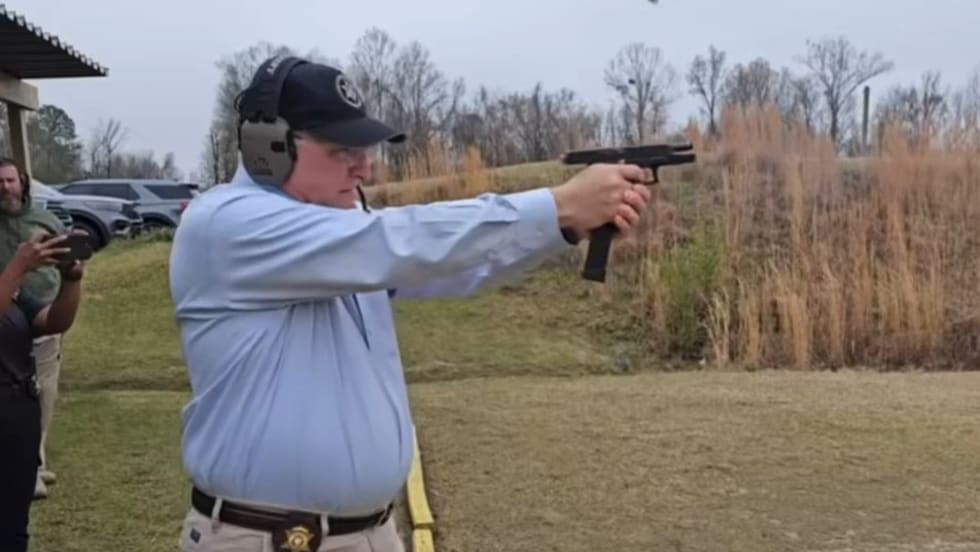If you need a reason to support concealed carry of handguns for retired and off-duty law enforcement officers, consider the case of Robert Clark.
Last March Clark, an off-duty officer of the San Diego Police Department, walked into the middle of an active shooting incident at Santana High School in Santee, Calif. Reacting to the situation as it developed, Clark drew his off-duty sidearm and assisted in the apprehension of the shooter. Two students were killed, 13 injured. But it could have been much worse if Clark had not been on the scene and armed.
James Fotis, executive director of the Law Enforcement Alliance of America (LEAA), is working hard to ensure that officers like Clark are always armed, on the job, off duty, or even retired. Nearly 10 years ago, Fotis and Rep. Randy "Duke" Cunningham (R-Calif.) drafted the Community Protection Act (H.R. 218), which if enacted will allow qualified off-duty and retired officers to carry concealed firearms across jurisdictions, without worrying about state, county, and municipal gun laws.
In the decade since H.R. 218 was introduced into the Congressional Record by Rep. Cunningham, the world has changed. And legislators who were once dead set against H.R. 218 now support the bill. More than 260 have not only expressed support for the bill, they have signed on as co-sponsors. A House bill only needs the support of 218 representatives to pass.
"We believe that if we could get the bill to the floor of the House and to the floor of the Senate that we would have an overwhelming vote on both sides," says Fotis.
But since the late '90s when 218 died in a House vote because it was attached to another piece of less popular legislation, LEAA and the other supporters have had no success in bringing the bill to the floor. The logjam is the chairman of the House Judiciary Committee, Rep. James Sensenbrenner (R-Wis.), who is single-handedly preventing 218 from reaching the House floor.
Congressman Sensenbrenner is not exactly the poster boy for gun control. From his voting record, he's clearly a conservative, and accordingly, his argument against H.R. 218 is one of the oldest in American political history: states' rights. Sensenbrenner opposes H.R. 218 because it would replace the confusing mess of local concealed carry laws with one overriding federal law.
Fotis argues that Sensenbrenner has no right to wrap himself up in the states' rights argument because of previous stands he's taken on other legislation. "Chairman Sensenbrenner signed on to the Brady Bill, which took away states' rights and rights directly away from individuals. So how can he oppose 218 because of states' rights? It's a very hypocritical stance," he says. Fotis also points out that the co-author of the bill, Rep. Cunningham, is one of the staunchest states' rights advocates in Congress.
Indeed, H.R. 218 is an issue that cuts across party and ideological lines. The bill now has strong support from both conservative Republicans who once opposed it on the grounds of states' rights and from liberal Democrats who opposed it as a pro-gun law.
The breadth and depth of support for 218 and Sensenbrenner's resolve to prevent the bill from coming to a vote have resulted in an unusual congressional maneuver. Supporters recently launched a discharge petition, a parliamentary procedure that allows the entire House to vote on whether a bill should move out of committee. A simple majority (218) of yes votes will move the bill to the floor, and it cannot be vetoed by the committee chair. So far, H.R. 218's discharge petition has 40 supporters, and Fotis believes it will pass very quickly.
Unfortunately, H.R. 218 did not pass fast enough for the many off-duty and retired officers who were attacked and had no means to defend themselves in the last decade.
The following is what the staff of Police Magazine hopes will be our last state-by-state guide to concealed carry laws for off-duty and retired officers. Note: state law doesn't necessarily trump city and county ordinances.












